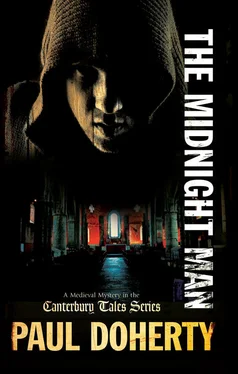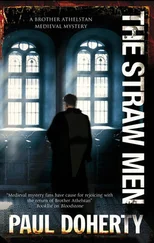Paul Doherty - The Midnight Man
Здесь есть возможность читать онлайн «Paul Doherty - The Midnight Man» весь текст электронной книги совершенно бесплатно (целиком полную версию без сокращений). В некоторых случаях можно слушать аудио, скачать через торрент в формате fb2 и присутствует краткое содержание. Жанр: Исторический детектив, на английском языке. Описание произведения, (предисловие) а так же отзывы посетителей доступны на портале библиотеки ЛибКат.
- Название:The Midnight Man
- Автор:
- Жанр:
- Год:неизвестен
- ISBN:нет данных
- Рейтинг книги:3 / 5. Голосов: 1
-
Избранное:Добавить в избранное
- Отзывы:
-
Ваша оценка:
- 60
- 1
- 2
- 3
- 4
- 5
The Midnight Man: краткое содержание, описание и аннотация
Предлагаем к чтению аннотацию, описание, краткое содержание или предисловие (зависит от того, что написал сам автор книги «The Midnight Man»). Если вы не нашли необходимую информацию о книге — напишите в комментариях, мы постараемся отыскать её.
The Midnight Man — читать онлайн бесплатно полную книгу (весь текст) целиком
Ниже представлен текст книги, разбитый по страницам. Система сохранения места последней прочитанной страницы, позволяет с удобством читать онлайн бесплатно книгу «The Midnight Man», без необходимости каждый раз заново искать на чём Вы остановились. Поставьте закладку, и сможете в любой момент перейти на страницу, на которой закончили чтение.
Интервал:
Закладка:
Paul Doherty
The Midnight Man
PROLOGUE
Murder, Master Geoffrey Chaucer of the Custom House, London, reflected, and mystery were two invisible chains which seemed to link all his fellow pilgrims as they wandered down the old Roman road towards Canterbury. Strange, Chaucer continued his musing, that Becket, whose blissful bones these pilgrims hoped to venerate, was the victim of both murder and mystery. Did Henry truly order the killing of his archbishop during those Christmas days over two hundred years ago? Some claim it was the work of his Queen Eleanor. .
‘Master Chaucer, you like this tavern?’
Chaucer broke from his reverie and smiled at the physician sitting next to him. He then gazed around the taproom of The Strong One of Jacob, a spacious, well-endowed hostelry with its lush gardens and lofty stories of open galleries, each with their own narrow guest chambers. Chaucer pointed to the window-shutters, flung back to allow in the warm scent from the herbers. ‘The day is fading,’ he murmured. ‘Darkness will fall and all these passageways and entrances will fill with dancing shadows.’
‘And another macabre tale will be told.’ The narrow-faced pardoner clawed at his straw-coloured hair, hanging lank as rats’ tails, before moving to finger the host of relics dangling on a chain around his neck, or pinned to the great woollen cloak Chaucer truly believed the pardoner had filched from The Tabard in Southwark.
‘Yes, another tale will be told,’ Chaucer lisped, scratching his neatly clipped moustache and beard. He glanced at the physician sitting next to him at the communal table. The physician, who openly despised the pardoner, had turned his back on that peddler of untidy, unholy rubbish. A handsome man, the physician’s face was oval-shaped and ruddy-coloured, the nose thin and sharp as a quill pen, deep laughter lines marking the full lips and clever grey eyes. He was clean-shaven, his silver-grey hair cropped close like that of a knight and, when he moved, his blood-red garments, slashed a bluish-green and lined with taffeta, gave off a pleasing perfume. Gold and silver rings glittered on his long fingers, their nails neatly pared and clean. A precise man, Chaucer concluded, in both dress and action, except for one nervous gesture: the physician kept fiddling with the Saint Joseph medal on a silver filigree chain around his neck. He followed Chaucer’s gaze, tapped the medal and smiled.
‘This, too, tells a story.’ He gestured down the table at the pilgrims, bellies now full, chattering amongst themselves. ‘We travelled well today,’ he murmured. ‘I mean, from Demonhurst. Thank God we’ll not sleep out in the open tonight.’ He paused as the miller made a grab at the buxom Wife of Bath who sat even more flushed-faced, wimple all askew. She opened her gap-toothed mouth and screamed so shrilly at her tormentor that it stilled all clamour. The miller withdrew, grabbed his bagpipes and blew a strident, wailing blast in reply. The knight, Sir Godfrey Evesden, warned the miller with an outstretched hand. Chaucer noticed how the knight, a self-confessed hunter of the Strigoi — blood-drinkers, even then did not fully turn his back on the monk; that dark shaven pate sat close, cowl pulled forward, hands pushed up the voluminous sleeves of his gown.
‘He keeps a dagger there, I am sure,’ Chaucer murmured to himself.
The yeoman, the knight’s faithful retainer, sitting directly across the table from the bald-headed, wolf-toothed monk, his eyes staring like those of a mad March hare, drew his knife. The cowled, cloaked man of the dark, as Chaucer secretly called the monk, swiftly showed his hands in a gesture of peace. Minehost, the keeper of The Tabard, also sensed the tension surfacing amongst this motley group of pilgrims who seemed, in one way or another, related to each other. He abruptly rose to his feet from his chair at the top of the table, clapping his hands for silence.
‘Fair gentlemen and ladies, Domini atque Dominae .’ Minehost tipped his head at the murmur of praise for his use of Latin. ‘The day is done and soon we are for the dark.’ He let his words echo like the peal of a funeral bell. ‘We have journeyed far, feasted well but, remember, we have decided that each of us tell a tale during our daily pilgrimage along the white, dusty shire roads.’ He paused. ‘At night, however, we tell a different tale, of murder, mystery and intrigue. We have promised visions of those who parade through hell carrying their severed heads like lanterns before them. We summon from the shadows those beings with skin like that of a boar and the face of a monkey.’
‘You mean the summoner?’ the miller shouted.
Up jumped the summoner, armed with a wooden trancher. The knight also sprang up, calling for his squire, who held Sir Godfrey’s sword. Down went the summoner, slamming the trancher back on the common board, glaring around at the rest of the pilgrims, daring anyone to continue their sniggers at the miller’s jibe. The franklin rose, combing his snow-white beard with the glittering fingers of one hand, the other resting on his silken purse with its ornate gold stitching. The purse was strapped to a beautiful Cordovan belt around the franklin’s bulging belly, which intended his purse to stay there, not cut by some thief such as the summoner, who’d been eyeing it as lustfully as he had the Wife of Bath’s shapely ankles in their gold-starred hose, ever since they’d left The Tabard in Southwark. The franklin rapped the table with the loving cup he always drank from.
‘My friends,’ he called over the whispers and murmurs, ‘fellow pilgrims, I insist that, for your silence, I buy us all jugs of wine and firkins of ale.’ The declaration was cheered with noisy banging on the table. ‘On one condition.’ The franklin grinned in a show of yellowing teeth. ‘By the time I count to forty, the same number of days as our Lord’s Lenten fast, one of you will have agreed to tell us a tale to tingle the spine and chill the blood.’
The franklin began counting. He’d reached twelve when the physician abruptly rose. Tall and dignified, he held up both hands. ‘I will,’ he declared. ‘Indeed, I already see my story curling into our midst like black smoke or some ruthless phantasm waiting amongst the dead for Death to come.’
‘What do you mean?’ the pardoner cried.
‘I have seen sights,’ the physician replied, ‘which haunt the soul for ever, poisoning life till life is done. There, my grim warning has your attention! So, hush now.’
The taproom did not seem so well lit now. Shadows moved. Timbers creaked. The weak fire in the stone-bound hearth crackled noisily, spitting sparks. Outside the darkness thickened. A brisk breeze stirred the branches of a tree to clatter against the bolted shutter, as if someone stood outside desperate to get in. So, as the light faded and night descended, the physician began his tale. .
The Physician’s Tale
Part One
Brother Anselm, Carmelite friar and principal exorcist to the Archbishop of Canterbury, closed his eyes and breathed out slowly. He and his clerk, the novice Stephen of Winchester, were now alone. The doors to St Michael’s, Candlewick in Dowgate Ward, London were closed and guarded by Parson Smollat and members of his parish council. All flambeaux , candles, cressets and tapers had been extinguished. They were alone in the darkness and already ‘the presence’, as Brother Anselm described it, was making itself felt. The usual mustiness had faded. The warmth of the spring day, still to be enjoyed in the gloomy cemetery beyond the corpse door, now disappeared. A horrid cold swept the nave of that ancient church, bringing with it the stinking stench of corruption, the horrid perfume of hell. The attack had already begun. Memories whirled through Anselm’s mind like black fat flies. He thought about what he had witnessed in Norwich. The lady who’d fled with her lover monk: her brothers had caught up and killed both her and her priestly paramour. They’d castrated the monk then drowned both in a sack weighed down with rocks. Their souls had refused to move on into the light and judgement. They had clustered in that derelict watermill, sheltering like bats twittering in a cave, the horror and bloody terror of their deaths darting out like tongues of hellish flames to disturb and harm the living.
Читать дальшеИнтервал:
Закладка:
Похожие книги на «The Midnight Man»
Представляем Вашему вниманию похожие книги на «The Midnight Man» списком для выбора. Мы отобрали схожую по названию и смыслу литературу в надежде предоставить читателям больше вариантов отыскать новые, интересные, ещё непрочитанные произведения.
Обсуждение, отзывы о книге «The Midnight Man» и просто собственные мнения читателей. Оставьте ваши комментарии, напишите, что Вы думаете о произведении, его смысле или главных героях. Укажите что конкретно понравилось, а что нет, и почему Вы так считаете.












